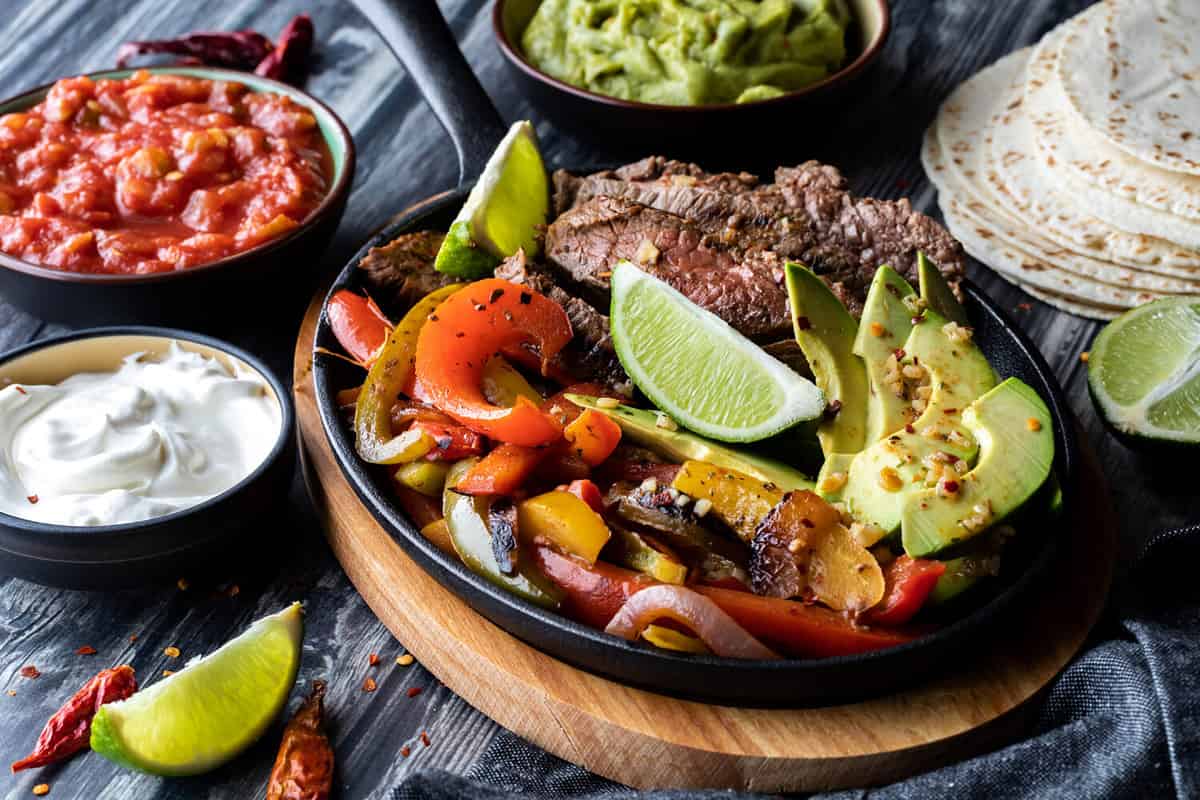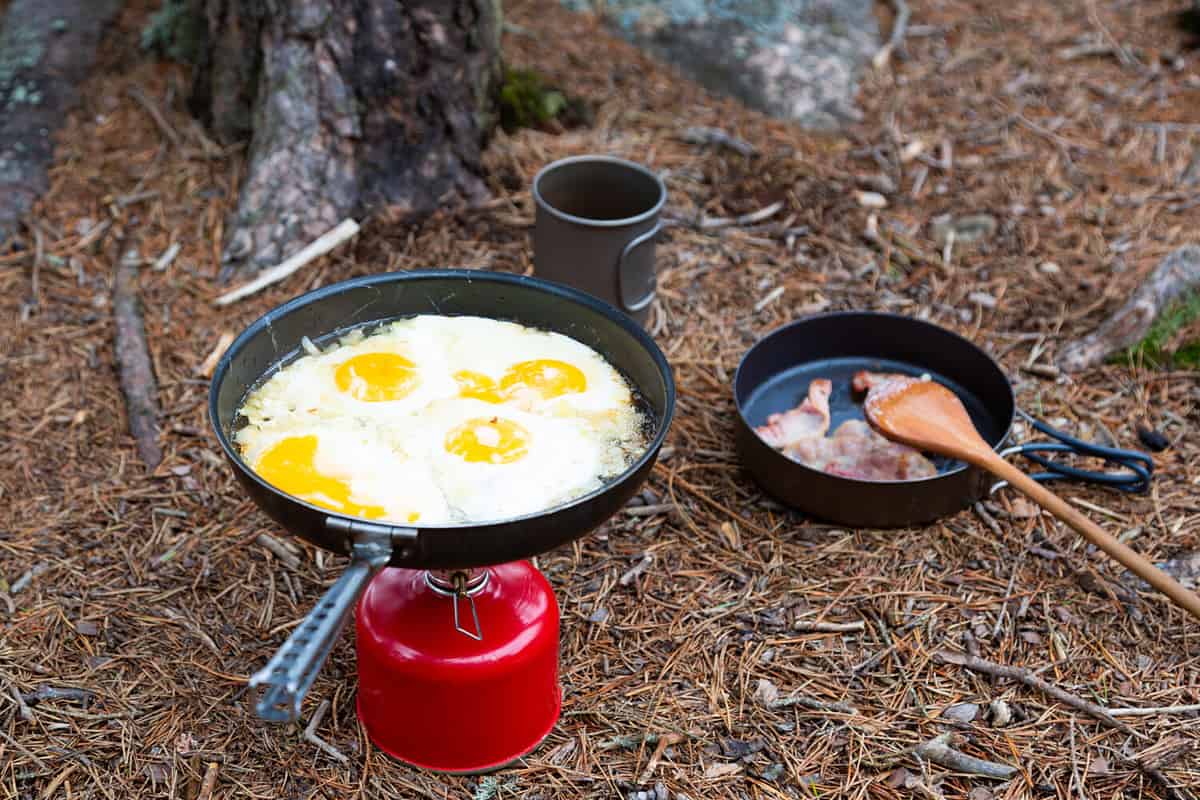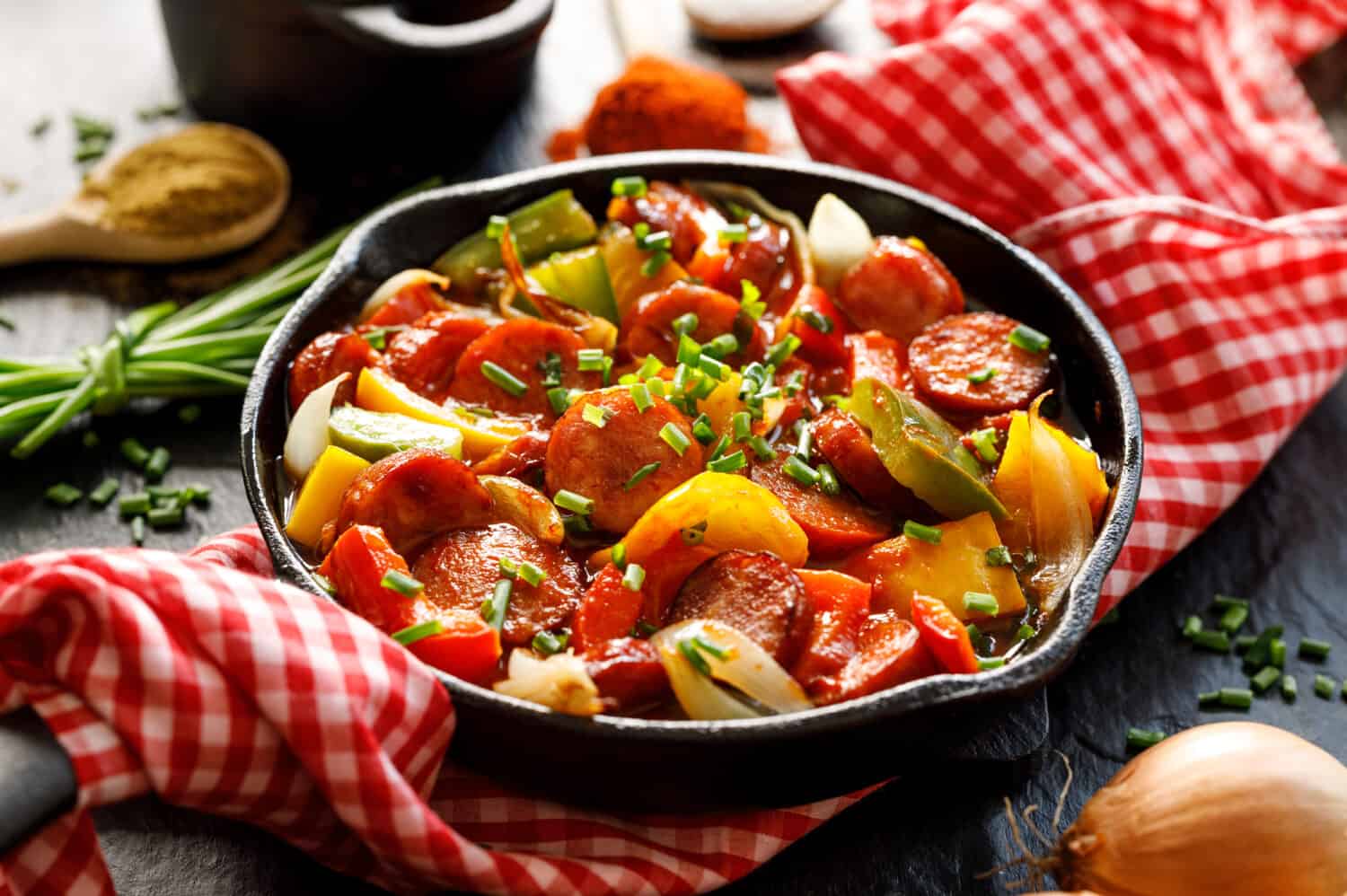No matter what your experience is in the kitchen, there comes a time when you have to pick out new cookware. If you’re not familiar with the various types, the options can be pretty overwhelming. From aluminum or stainless steel to copper or cast iron, it’s important to know the pros and cons of each type. During your search, you might compare titanium vs. cast iron cookware.
The main difference between titanium and cast iron cookware is their weight and thermal conductivity. Titanium cookware is popular for outdoor cooking because of how lightweight it is. On the other hand, cast iron cookware is made of iron ore, and while it is incredibly durable, it’s also heavy to carry around. Titanium cookware can also refer to stainless steel cookware that includes a titanium-reinforced cooking surface.
While titanium and cast iron cookware both have their own benefits, they also have much different uses. Keep reading to find out more about the difference between these two types of cookware and when you should use each.

Cast iron cookware has numerous uses in the kitchen when compared to titanium.
©Toasted Pictures/Shutterstock.com
Titanium vs. Cast Iron: What Is the Difference?
Cookware isn’t just for use in the home. If you’re doing any research on titanium cookware, you’ll read a lot about camping tools since titanium cookware is most popular for outdoor use. While one of the benefits of cast iron is you can use it to cook anywhere, titanium is quickly becoming a popular alternative.
The most notable difference between titanium and cast iron is titanium cookware is much lighter. This is the main reason why it's a popular choice with outdoor enthusiasts. One of the benefits of cast iron is if you’re cooking at home, it can go directly into the oven. However, it’s quite heavy to carry around which makes it difficult to bring on backpacking or hiking trips.
Durability is something to consider when investing in a new set of cookware and cast iron is incredibly durable. In fact, it's so durable that many people pass down their cast iron skillets to the next generation. While cast iron is not naturally non-stick, seasoning your cast iron cookware or even buying it pre-seasoned creates a non-stick surface.
When someone references titanium cookware, this often means stainless steel cookware that includes a titanium cooking surface, but this type of stainless steel cookware doesn’t actually contain that much titanium. The only fully titanium cookware you’ll find is generally designed for camping. Titanium cookware is light enough to carry around, but it isn’t great for indoor usage. Although it heats up quickly, it tends to have hot spots which makes it helpful for boiling water but not for searing or sauteing.
Advantages of Titanium Cookware
Often, when you see cookware described as titanium, it’s usually stainless steel that has a titanium cooking surface. Sometimes, titanium is even a marketing term used to describe cookware as durable. If you do find cookware that’s 100% titanium, it’s often outdoor cookware. Here are some of the benefits of using titanium cookware:
- Lightweight
Titanium cookware is so popular for outdoor cooking because it’s significantly lighter than stainless steel or aluminum. However, it’s still strong enough to serve the purpose of cooking outdoors over a flame. Cast iron isn’t realistic for outdoor cooking for those who are backpacking or hiking because of how heavy it is. - Transfers heat quickly
Titanium cookware transfers heat quickly, which makes it perfect for tasks such as boiling water. This also makes it a great choice for outdoor cooking, but it’s not ideal for cooking full meals. - Durable
Titanium easily resists corrosion, which makes it durable and easy to use for a long time. It also makes it a great choice to carry around during an outdoor adventure.
If you’re going to be camping or doing some outdoor cooking, titanium cookware can be a great investment.
Advantages of Cast Iron Cookware
There are many fans of cast iron who swear by this type of cookware. Many even refuse to use anything else in the kitchen. Cast iron is the type of cookware you can pass down from one generation to the next. While it’s the heaviest type and isn’t realistic for use in outdoor cooking, it has many other uses in the kitchen. Here are some of the benefits of cast iron cookware:
- Long-lasting
One of the main benefits of cooking with cast iron is it’s often a one-time investment. Cast iron cookware is incredibly durable and long-lasting, so you don’t have to worry about it breaking or scratching as you do with aluminum or other types of cookware. - Cook with it anywhere
Whether you’re using the stovetop, the oven, a flame, or all three, cast iron works well with numerous heat sources. You can use cast iron on a gas, electric, or induction stovetop. It can also easily transfer from the stovetop to the oven. - Holds heat for a long time
After your meal is ready, your cast iron pan holds heat well so you don’t have to worry about your food getting cold. This also makes the cookware perfect for both cooking and serving. - Affordable
Even though cast iron cookware can last forever, it’s still relatively affordable. If cast iron cookware is the right choice for you, it’s worth investing in a set. You can also purchase cast iron skillets in a variety of shapes and sizes.
There’s a reason why cast iron has been around for so long. While cast iron cookware is heavier than any other type, there are more pros than cons to cooking with cast iron.
Which Is Better for Induction Cooking?
In recent years, induction stove tops have become more popular, and it’s easy to see why. Many think induction cooking is the method of the future, and there are numerous benefits to buying an induction oven.
While an induction cooktop looks similar to an electric cooktop, the main difference is that an induction stove uses a magnetic field to heat and cook your food. One of the reasons they’ve become so popular is because they’re about 5-10 percent more energy efficient than electric stoves.
They’re also safer because the heat comes from the cookware itself. This means if you turn on the burner without a pot on it, it won’t heat up. This is an appealing safety feature, especially for those with little ones.
Titanium itself isn’t compatible with induction cooking, but you can use some cookware with stainless steel and titanium with an induction oven. However, you can use cast iron on an induction stovetop, and this is often the better option if you’re cooking on an induction stovetop or range.

Titanium cookware is a popular choice for those who plan on using it outdoors, especially for camping or hiking trips.
©Raland/Shutterstock.com
Which Is More Durable: Titanium or Cast Iron?
Titanium has become one of the more popular cookware for traveling and camping because of how lightweight it is compared to other materials. One of the benefits is also its durability since it is resistant to corrosion and doesn’t scratch as easily as stainless steel.
Despite the durability of titanium, it can’t compare to the long-lasting nature of cast iron. Since cast iron is nearly indestructible in the kitchen, some choose to pass down their cast iron skillets as family heirlooms. Titanium is durable enough to use on the go, but cast iron will last longer than nearly any other type of cookware.
Cost of Titanium vs. Cast Iron Cookware
Most cooking tools you buy are an investment, but investing in the right tools can make your life a lot easier. Even though cast iron cookware can last a lifetime, it’s actually a more affordable option than titanium.
You can generally purchase a decent-sized cast iron skillet for less than $50, depending on where you buy it from. If you purchase a smaller skillet, you can find one for around $20. On the other hand, titanium cookware isn’t quite as affordable.
While there's a lot of variety in titanium cookware, fully titanium pots or pans are often the most expensive. It has a higher cost due to the properties of this type of cookware and a titanium pan might cost between $30-$75 depending on the brand and quality. The durable and lightweight material of titanium makes it ideal for traveling so you’re paying for the cost of that convenience.
Which Is Safer: Titanium vs. Cast Iron
Safety and health are other qualities to consider when it comes to the type of cookware you’re using. Not all pots or pans are created equal, especially when it comes to safety.
Titanium is a non-reactive material, which makes it a great choice for those concerned about safety. While some types of metal cookware react with acidic foods, leading to atoms being transferred to your food, titanium is non-reactive and non-toxic.
Cast iron is another safe type of cookware to use. One thing to consider is that when cooking with cast iron, you will end up with more iron in your food. This can actually be a benefit for many since iron is essential and cooking with cast iron is a great way to boost the amount of iron in your diet. When cooking with acidic foods like tomatoes, the amount of iron is higher.
It is important to keep in mind that those who already have high iron levels or are under the age of three years old are more susceptible to iron toxicity. If you need more iron in your diet, cast iron is a safe and healthy choice. However, if extra iron may cause an issue, it’s best to stay away from cast iron cooking or use it in moderation.
Which Is the Better Cookware: Titanium vs. Cast Iron
Many people who have a preference for cookware have strong opinions about which type is best. Like most cookware, when deciding between titanium vs. cast iron, it’s essential to examine what you’ll be using it for.
You can use both titanium and cast iron cookware for outdoor cooking. While many swear by cast iron cookware for camping or backpacking, the sheer weight of cast iron skillets or pans is something to consider. Titanium is a much lighter choice that’s also durable enough to carry around. However, it’s not as useful when cooking full meals outdoors or in the kitchen because it will often have hot spots.
If you’re planning on cooking a variety of meals, cast iron is going to be a more dependable and versatile option and it’s durable enough to last for generations.
The image featured at the top of this post is ©zi3000/Shutterstock.com
